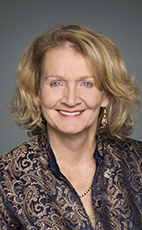Mr. Speaker, as this is my first opportunity to rise in front of this wonderful House, I would like to thank the people of Kanata—Carleton for having placed their faith in me. I look forward to being able to serve as their representative. I also look forward to being able to serve Canada's veterans as the Parliamentary Secretary to the Minister of Veterans Affairs.
I am thankful for the opportunity to address the issue of Canada's contribution to the military effort against ISIL.
I would like to begin by saying that I thoroughly enjoyed the 31 years I spent in the Canadian Forces. I visited over 65 countries around the world and I saw the nature of the work that Canada can do and the contributions that she can make. I worked with some of the most intelligent, dedicated, and professional individuals in the world. I have been involved in the operations in the first Gulf War and Afghanistan, which made a lasting impression on me.
During my time at NATO, I spent four years in the NATO air headquarters in Ramstein, Germany. I gained a very solid understanding of the entire force effort required to succeed in any mission. I spent those four years in the operations branch, which required us to determine the list of skills, capabilities, people, and equipment required on any mission that NATO was going to embark upon. I gained an understanding of just what was required to make a success of any one of these missions.
A lot of this operational support, such as training and logistics, is not celebrated in the public view, but it is no less critical to the success of the mission.
During my 31 years as a member of the Canadian Forces, I did a tour in Afghanistan and spent time at NATO headquarters, so I know what the men and women of the Canadian Forces can contribute to international missions.
That tradition has not changed and today Canadians can continue to be extremely proud of our men and women in uniform. They are well trained, enormously dedicated, and have a lot of work to do across the country and around the world. The men and women of the Canadian Forces have made a significant contribution already to the fight against terrorism and ISIL. They will continue to make a significant contribution, alongside our allies, in the fight against terrorism and ISIL.
Today, Canadian Forces members have a global reputation not simply for our force projection capabilities, but also for our training and logistics. As we all know, the Royal Canadian Air Force has contributed to the air effort of this immense 60-country coalition and all Canadians should be very proud of this contribution. The war on terrorism and ISIL, however, requires a multifaceted approach that degrades not only their fighting capability but also their command and control; stems the tide of foreign fighters into ISIL; denies their logistics and financing; stabilizes the population; and develops the long-term conditions required for peace, security, and prosperity, such as the development of a standing security force.
It is only by creating an environment that allows for the safety and security of its citizens that terrorism and ISIL will be defeated. Medium and longer term goals must also address the region's ability to provide good governance, stability, security, and economic opportunities for its people. Canada and the Canadian Forces have world-renowned capabilities to help achieve these goals, and we need to step up our efforts in these critical areas. Suggesting that training local security forces to protect their country and their citizens is any less of a contribution than air strikes is doing a great disservice to our men and women in uniform.
Canadians have time and time again provided the training and support required for mission success right around the globe, and the Canadian Forces have provided this training in operational theatres. It has been that way for years. This has placed Canada in the unique position of being recognized as an expert in this area, and this global expertise will be a critical component in adding to the stability of that region.
To achieve success in the region, Canada's approach needs to consider the many factors that will create long-term peace, and our government recognizes the need for a comprehensive, multi-faceted, and calculated plan that addresses the end-to-end effort, not only the short-term objectives. That planning and consultation with our allies is currently underway.
Canada has world-renowned capabilities that can contribute to all aspects and phases of this comprehensive plan, but there is also a need to concentrate efforts on these next steps. Iraqi and Kurdish forces need to provide the means of maintaining security in the region to ensure that the gains we make as a result of the combat mission are not immediately lost. They go hand in hand.
The lack of good governance, insecurity, and hopelessness are all contributing factors that drive terrorism, and they have led to the humanitarian crisis that we see unfolding before us today.
The protection of Canadians is the most important mandate of any government. On a daily basis in Canada, the combined forces of the RCMP and CSIS; local, provincial, and national police departments; the Canada Border Services Agency; and the Canadian Forces protect the interests of all Canadians, and they perform their duties with honour and integrity.
Here is a little fact for the House. The Canada Border Services Agency conducts interview screening on approximately 270,000 individuals entering Canada every single day—

